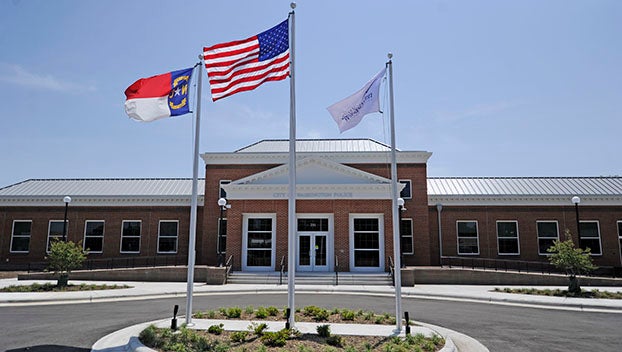K-9 cop visits Washington
Published 1:02 am Wednesday, September 28, 2011

Chief Oleg Vanishkin (center) presents Mick Reed (left), chief of the Washington police force, with a uniform a Russian K-9 officer wears while working as Svetlana Bozhenova, a Russian K-9 officer and dog trainer, observes. (WDN Photo/Mike Voss)
Oleg Vanishkin isn’t just a Russian K-9 officer. He’s the police chief over 572 K-9 officers in a greater metropolitan area of 2.5 million people in the Russian Urals.
Vanishkin was in Washington on Tuesday as part of a visit to the United States to learn from and teach K-9 trainers and K-9 officers and talk with animal-control officers. He was accompanied by Svetlana Bozhenova, a K-9 officer.
“This is amazing,” said Mick Reed, chief of the Washington Police Department, as interpreter Natalya Pawlick explained Vanishkin’s K-9 corps.
Vanishkin, in full dress uniform, explained through the interpreter that he buys dog food made on the American West Coast to feed his dogs.
“You have no idea what kind of honor this is. I came out just expecting to meet a nice gentleman and trade stories back and forth,” Reed said as the entourage gathered in the lobby of the police station. “This is absolutely an honor.”
Vanishkin, 32, is the son of a Russian general. Among the medals on his chest was one presented to him by Russian President Vladimir Putin for being the top police chief in Russia, Natalya Pawlick said.
Monday, the Russians visited a school in Rocky Mount where dogs are trained for K-9 service. Their visit in Washington was to see how a local police department operates its K-9 program. They learned Washington has one K-9 officer and one dog. In Russia, Vanishkin’s K-9 officers work in teams and rarely have special patrol vehicles for transporting K-9 officers and dogs.
In Washington, a special vehicle is required for a K-9 officer and dog.
In both places, K-9 officers take their dogs home with them when they get off duty. Those officers also may adopt their canine partners when the dogs retire from duty.
The two chiefs talked budgets, how their departments are funded and how personnel are utilized.
Bozhenova is excited about returning to the training school in Rocky Mount today. She wants to further examine training methods employed at the school. She expressed concern that on Monday a trainer was working with a dog he considered possibly unsuitable to work as a narcotics-detecting dog. Bozhenova said she would have further evaluated the dog’s potential to become a narcotics dog before beginning its training. The training and the money spent to train the dog could be wasted if the dog proves unsuitable for narcotics work.
Currently, Bozhenova trains dogs to detect bombs and works with such dogs after they are trained. Previously, she worked with narcotics dogs. One of her former canine partners saved her life three times, according to Pawlick.
Asked what he’s learned during his visit and what he’s taking back to Russia with him, Vanishkin said he’s appreciative of the openness he’s experienced. He also said he’s learned procedures used in America that might prove workable in Russia.
The Russian chief was impressed with the computers and other equipment found in the Washington patrol cars. To familiarize them with a Washington patrol car, Vanishkin and Bozhenova were taken on a brief patrol through Washington’s streets.
Asked to identify his favorite American food, Vanishkin replied, “McDonald’s.”
“The food tastes the same here as it does at a McDonald’s in Russia,” Vanishkin said through the interpreter.
Vanishkin also admitted to liking barbecue — eastern North Carolina style.
The two chiefs exchanged gifts. Vanishkin presented Reed with a desk set and two metallic, engraved discs. Reed presented Vanishkin with a WPD command officer’s hat, Bozhenova with a patrolman’s cap, both with WPD shoulder patches and the entire entourage with WPD coffee cups.






